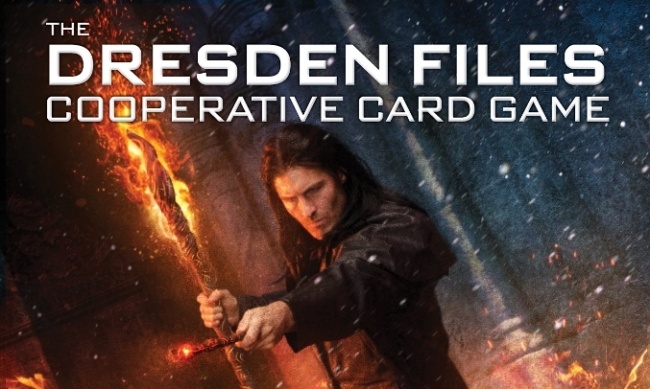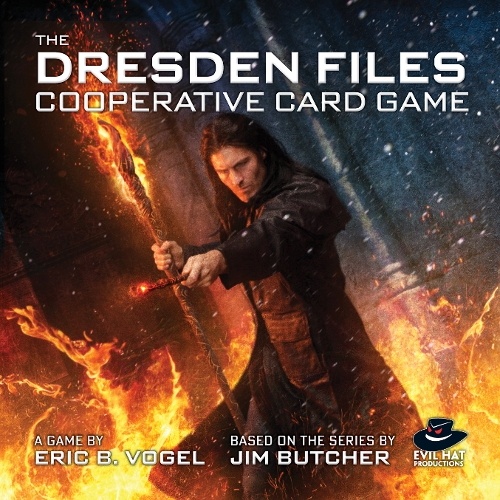The Dresden Files Cooperative Card Game
Publisher: Evil Hat Productions
Release Date: June 2017
Price: $39.99
Game Designer: Eric B. Vogel
Format: Cooperative Card Game
Number of Players: 1-5
Playing Time: 30 minutes
Age Rating: 13+
ICv2 Rating: 4.5 Stars out of 5
For experienced players, this may be the most interesting co-op game since the original Pandemic. For fans of urban fantasy fiction, it will be a treat, but also a challenge.
The board exists only as a place to keep track of cards and tokens, but is nicely done and very helpful. During the course of the game you will have scenario cards and three kinds of tokens to keep track of, and the board makes that simple.
Each player represents a character from a Dresden Files story. For those who have never read the books or watched the television show, it’s urban detective fantasy in modern Chicago. If that concept sounds interesting, reading the books won’t matter, although some of the cards will be more amusing if you’ve read the stories. For instance, one of the characters is an agnostic Holy Knight, but if you’ve read the story in which he’s introduced, that seeming contradiction will make perfect sense.
Each game will consist of playing out the plot elements from a Dresden Files novel, or a random scenario generated from elements from Dresden Files short stories. Because the cards for the scenario come out on the table in random order, this allows for a huge amount of replay options. You often must interact with elements of the story in a certain order, which will be difficult because of the setup, as your actions have a "range." That range works from left to right on the layout of scenario cards, so you might have to deal with an obstacle at close range before gaining an advantage that is farther away, or defeating an opponent at all.
Some of the starting setups can be easier than others, but none will be outright easy. If you are looking for a co-op game in which the players always win, this is not it. In actual play, one of the attractive aspects of the game is that the final score is often very close up to the end, as players are trying to solve one last case before they run out of actions, or defeat one last opponent. Thus, there’s an element of tension the whole time, no matter whose turn it is. There is a small chance of finishing off a case of an opponent with special end-of-scenario roll of the dice, but that trick rarely works, as the odds are deliberately set against your winning by luck at the last minute. Ties go in favor of the bad guys, so players have to win outright. Most of the time, victory is by a single point, or at most two. Rarely does a close win or loss feel like it was due to luck, though.
Each player will have a VERY limited number of actions in the entire game, limited both by a very small hand of cards and a shared pool of action points. So, each action by each player will matter. The effects of some of the cards have modifications to cost, range or effects from a +/- die roll, and this is the only luck factor to the game, other than the initial order of the scenario cards. There are just enough die rolls to balance out over the course of a game, although epic successes or failures are possible, to the cheers or groans of the whole group when they happen.
As a group, players are trying to defeat bad guys, overcome obstacles and solve cases, and occasionally acquire advantages, like extra cards or extra action points. In addition to the hand of cards, each character has a special ability to use whenever the right circumstances come up [usually having to discard a card] and another one-time special ability. Players need to use these carefully. Often, you must choose between using a card which is expensive in action points and using that same card to replenish the action point pool for another player. Selfish play loses the game. Failure to cooperate loses the game. Hack-and-slash without thinking loses the game. It’s hard to win and easy to lose, but that is the appealing challenge of the game.
For players who cooperate well, and who use their brains to maximize the effects of their actions, the game is rewarding and interesting. The rules are easy, but the play of the game is not, at least for the first game or two. Players not used to cooperative games will have to get used to working together. It might be easier for players used to role-playing games, as it may make it easier to get into character and think in terms of using your limited skills and actions to benefit the group as a whole.
You must include Harry Dresden in the mix of characters, but can otherwise pick and choose, to suit the preferred style of play of the individual player. There is a police detective, an investigative reporter, a couple of warrior-types, a pair of werewolves, and others, between the base game and the expansion packs. If you like the starting scenarios, you will want the expansions, both for the extra scenario cards and for the added character options.
The 30-minute length is optimistic for your first game or two, but after players learn the mechanics it really does go that quickly.
--Nick Smith: Librarian Technician, Community Services, for the Pasadena Public Library in California.

ICv2 Stars: 4.5 (out of 5)
Posted by Nick Smith on May 19, 2017 @ 4:17 am CT



